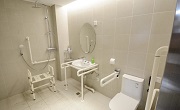Epidemic rebounds in several venues of European Football Championship
According to the epidemic monitoring site for the venues of the European Football Championship launched by the WHO, there is an obvious COVID-19 rebound in eight of the 11 competition areas and the other three are in a stable situation.
The monitoring site shows that epidemic rebound has been found in several competition areas, including Amsterdam, Baku, Bucharest, Copenhagen, London, Rome, St. Petersburg, and Sevilla. The epidemic in Budapest, Glasgow, and Munich remains in a stable situation.
In epidemic monitoring for the competition areas, London Borough of Brent, where Wembley Stadium is located, is shown in the London competition area, while the data for the entire Lazio Region is shown for the Rome competition area. There have been 707 new cases in the past seven days in London Borough of Brent.
According to a report by Public Health Scotland in late June, nearly 2,000 new confirmed cases of COVID-19 in the Scottish region recently may be associated with the European Football Championship. A study by Imperial College London found that there was an increasing number of confirmed COVID-19 cases in June in England with a low proportion of females testing positive, which may be relevant to males watching the game of the European Football Championship.
Data from the health authorities of the Andalusia Region, Spain, where Seville is located, show that, since the beginning of the European Football Champion, there has been a significant increase in the number of new cases of COVID-19 locally. Health authorities believe that the main reasons for the sudden and large increase in the number of infections are due to the massive influx of fans and the increase in the number of tourists. In addition, the fans were always unmasked when parading and gathering, which increases the risk of infection.
The WHO previously stated that crowds gathering at the venues and the city bars, and the loose social and travel restrictions have made the new cases increase 10% in the last week of June. Dr. Catherine Smallwood, Senior Emergency Officer, WHO Regional Office for Europe, claimed that the trend that the new cases decreased for 10 weeks in Europe has stopped.
The original article is contributed by Liu Yang, translated by Fei Jinglun.
Find the original piece at https://epaper.gmw.cn/gmrb/html/2021-07/14/nw.D110000gmrb_20210714_5-16.htm
[ Editor: WXY ]










More From Guangming Online
Medics from Fujian leave for Shanghai to aid in battle against COVID-19 resurgence
New int'l land-sea transport service to Indo-China Peninsula launched
Another makeshift hospital under construction in Shanghai
Tourists view tulips in Suiping County, Henan
In pics: blooming gagea flowers on grassland in Zhaosu, Xinjiang
Greek workers stage 24-hour general strike over high prices